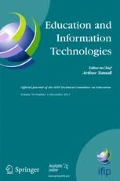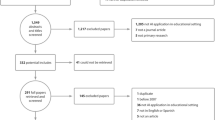Abstract
Many educational institutions use a large number of information systems to automate their activities for different stakeholders’ groups – learning management systems, student diary, library system, digital repositories, management system, etc. This leads to a significant increase in the volume and variety of data that can be captured, stored, and harnessed to improve student learning and school effectiveness. Educational institutions are realising that, with the help of technology, they are collecting data that could be very valuable when properly analysed, aligned with learning outcomes, and integrated into a tighter feedback loop with stakeholders. In addition, the analysis of data can help their managers to take data-driven decision making at all levels of educational institutions. The paper presents a comprehensive approach to Learning Analytics in the field of Secondary Education from the perspective of all different stakeholders, which aims to improve its methods of approaching and analysing learning data. On the basis of a literature review in the field and an investigation of requirements for quality evaluation of learning in school education, the corresponding stakeholder groups are identified - students, teachers, class teachers, managers, parents, inspectors and 6 models (1 model per each stakeholder group) for data collection and personalized and meaningful analysis are proposed for the needs of Learning Analytics. Each model consists of measurable indicators allowing the relevant stakeholder to track data for students’ learning or training for different purposes, e.g. monitoring, analysis, forecast, intervention, recommendations, etc., but finally to improve the quality of learning and teaching processes. The proposed models are evaluated by the representatives of 4 stakeholder groups – students, teachers, class teachers, parents.
Similar content being viewed by others
References
Abo, R., Koga, T., Horikoshi, I., Yamazki, K., & Tamura, Y. (2016). Data visualization framework for learning analytics, The International Workshop on Learning Analytics and Educational Data Mining (LAEDM 2016).
Admiraal, W., Vermeulen, J., & Bulterman-Bos, J. (2017). Learning Analytics in Secondary Education: Assessment for Learning in 7th Grade Language Teaching, ECER 2017, https://eera-ecer.de/ecer-programmes/conference/22/contribution/39935/.
Andrade e Silva, M., & Camanho, A. (2017). Using data analytics to benchmark schools: The case of Portugal. In B. Vanthienen & K. Witte (Eds.), Data analytics applications in education. New York: Auerbach Publications.
Andresen, B. (2017). Learning analytics for formative purposes, Tomorrow's Learning: Involving Everyone. Learning with and about Technologies and Computing, Springer International Publishing.
Avella, J., Kebritchi, M., Nunn, S., & Kanai, T. (2016). Learning analytics methods, benefits, and challenges in higher education: A systematic literature review. Online Learning, 20(2), 13–29.
Brun, A., Bonnin, G., Castagnos, S., Roussanaly, A., & Boyer, A. (2019). Learning analytics made in France: The METAL project. International Journal of Information and Learning Technology, 36(4), 299–313.
Campbell, J., De Blois, P., & Oblinger, D. (2007). Academic analytics: A new tool for a new era. Educause Review, 42(4), 40–57.
CHEIE. (2016). Ordinance no. 13 on civil, health, environmental and intercultural education, https://www.mon.bg/bg/59.
Conde, M., & Hernandez-Garcia, A. (2015). Learning analytics for educational decision making. Computers in Human Behavior, 47, 1–3.
Davis, S. K., Edwards, R. L., Miller, M., & Aragon, J. (2018). Considering context and comparing methodological approaches in implementing learning analytics at the University of Victoria. Proceedings 8th international conference on Learning Analytics & Knowledge (LAK18), 1–4.
Dehler, J., Bodemer, D., Buder, J., & Hesse, F. W. (2011). Guiding knowledge communication in CSCL via group knowledge awareness. Computers in Human Behavior, 27(3), 1068–1078.
Ebner, M., & Schön, M. (2013). Why learning analytics for primary education matters! Bulletin of the IEEE Technical Committee on Learning Technology, 15(2), 14–17.
ESLO. (2016). Ordinance no. 11 on the evaluation of student learning outcomes, https://www.mon.bg/bg/59.
Ferguson, R., Brasher, A., Clow, D., Cooper, A., Hillaire, G., Mittelmeier, J., Rienties, B., Ullmann, T., & Vuorikari, R. (2016). Research evidence on the use of learning analytics - implications for education policy. R. Vuorikari, J. Castaño Muñoz (Eds.). Publications Office of the European Union.
Guo, J., Huang, X., & Wang, B. (2017). MyCOS Intelligent Teaching Assistant, 392--393.
Hylen, J. (2015). The State of Art of Learning Analytics in Danish Schools, http://www.laceproject.eu/blog/the-state-of-art-of-learning-analytics-in-danish-schools/.
IDPSES. (2016). Ordinance no. 8 on information and documents for the pre-school and school education system, https://www.mon.bg/bg/59.
IEO. (2016). Inclusive Education Ordinance, https://www.mon.bg/bg/59.
IKS. (2016). Ordinance No. 15 on the Inspection of Kindergartens and Schools, https://www.mon.bg/bg/59.
Jivet, I., Scheffel, M., Specht, M., & Drachsler, H. (2018) License to evaluate: Preparing learning analytics dashboards for educational practice. Proceedings of the 8th International Conference LAK, 31–40. ACM.
Khine, M. (2018). Learning Analytics for Student Success: Future of Education in Digital Era, The European Conference on Education 2018.
Long, P., & Siemens, G. (2011). Penetrating the fog: Analytics in learning and education. Educause Review, 46(5), 31–40.
Macarini, L., Santos, H., Cechinel, C., Ochoa, X., Rodes, V., & Casas, A. (2019). Towards the implementation of a countrywide K-12 learning analytics initiative in Uruguay. Interactive Learning Environments, 28(2), 166–190.
Macon, B., Macon, L., & Phillips, N. (2016). Learning analytics: Case studies at a large Urban Community college, 2016 International Conference on Computational Science and Computational Intelligence (CSCI), IEEE, Las Vegas: NV, pp. 258–263.
McKay, E. (2019). Digital literacy skill development: Prescriptive learning analytics assessment model, Australian Council for Educational Research, Research Conference 2019, pp. 22–28.
Meyers, E., Cahill, M., Subramaniam, M., Stripling, B. (2016). The promise and peril of learning analytics in P-12 education: An uneasy partnership?, iConference 2016.
Mouri, K., Yin, C., & Uosaki, N. (2018). Learning analytics for improving learning materials using digital textbook logs. Information Engineering Express International Institute of Applied Informatics, 4(1), 23–32.
NIE (n.d.) National Inspectorate of Education, Inspection Criteria, https://nio.government.bg/инспектиране/критерии/.
Papamitsiou, Z., & Economides, A. A. (2015). Temporal learning analytics visualizations for increasing awareness during assessment. RUSC. Universities and Knowledge Society Journal, 12(3), 129–147.
Pardo, A., Dawson, S., Gašević, D., Steigler-Peters, S. (2016). The role of learning analytics in future education models, https://www.telstra.com.au/content/dam/tcom/business-enterprise/industries/pdf/tele0126_whitepaper_5_spreads_lr_notrims.pdf
PSEA. (2015). Pre-school and School Education Act, https://www.mon.bg/bg/57.
Sancho, M., Cañabate, A., & Sabate, F. (2015). Contextualizing learning analytics for secondary schools at micro level, 2015 International Conference on Interactive Collaborative and Blended Learning (ICBL), Mexico City, pp. 70-75.
Sclater, N. (2017). Learning Analytics Explained, Routledge, 1st edn, 290 pages.
Sergis, S., & Sampson, D.G. (2016) School analytics: A framework for supporting school complexity leadership. In: Spector J., Ifenthaler D., Sampson D., Isaias P. (eds) Competencies in Teaching, Learning and Educational Leadership in the Digital Age. 79-122.
Siemens et al. (2011). Open Learning Analytics: an integrated & modularized platform Proposal to design, implement and evaluate an open platform to integrate heterogeneous learning analytics techniques, https://solaresearch.org/wp-content/uploads/2011/12/OpenLearningAnalytics.pdf
Varanasi, M. R., Fischetti, J. C., & Smith, M. W. (2018). Analytics framework for K-12 school systems. In E. Mense & M. Crain-Dorough (Eds.), Data leadership for K-12 schools in a time of accountability (pp. 206–233). Hershey: IGI Global.
Funding
The paper is partly supported within the project MU19-FTF-001 “Intelligent Data Analysis for Improving the Learning Outcomes” of the Scientific Research Fund at the University of Plovdiv “Paisii Hilendarski”.
Author information
Authors and Affiliations
Corresponding author
Ethics declarations
Conflict of interest
Not applicable.
Additional information
Publisher’s note
Springer Nature remains neutral with regard to jurisdictional claims in published maps and institutional affiliations.
Rights and permissions
About this article
Cite this article
Gaftandzhieva, S., Docheva, M. & Doneva, R. A comprehensive approach to learning analytics in Bulgarian school education. Educ Inf Technol 26, 145–163 (2021). https://doi.org/10.1007/s10639-020-10261-w
Received:
Accepted:
Published:
Issue Date:
DOI: https://doi.org/10.1007/s10639-020-10261-w




